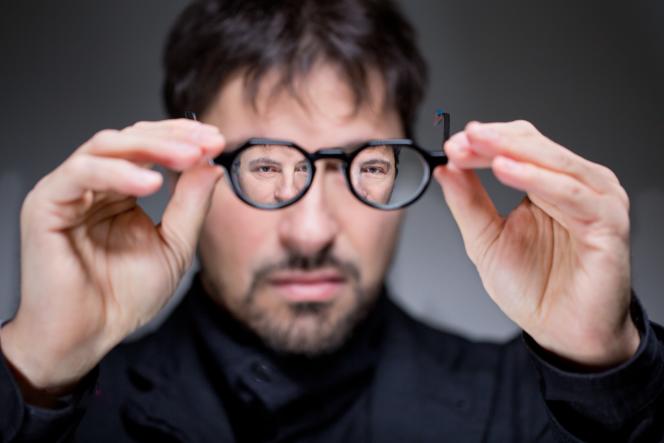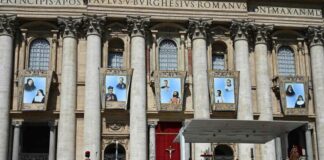In the register of creations – worldwide or French – on the ManiFeste poster, Italy stands out from the crowd with three men and three women who should be named in order of entry into the festival scene. Marco Stroppa at the Orchester de Paris program (June 8 and 9), Clara Iannotta at the Ensemble intercontemporain (June 10), Francesco Filidei at a concert by the Ensemble orchestral contemporain (June 15), on the poster of which will also be Lara Morciano, a few days before a portrait in two parts (the 18th) dedicated to Stefano Gervasoni and a spotlight (the 25th) on Francesca Verunelli.
To this majority presence of Italians in the concerts must be added that of the musical collective /nu/thing, which designed the electronics of the Polytope 2022. Four composers (Andrea Agostini, Daniele Ghisi, Eric Maestri, Andrea Sarto) including, according to the director of Ircam, Frank Madlener, the work “with eight hands” is really out of the ordinary, knowing that “one erases or extends what the other has sketched in a way of writing that cannot be reduced principle of the exquisite corpse”. If we finally note the presence of one of these four musketeers of prospective electro, Daniele Ghisi, in the credits of one of the Music-Fictions (Naissance d’un pont, on a text by Maylis de Kerangal), the red thread, or rather green-white-red, of programming is quickly found.
“To be honest, I didn’t realize it immediately”, assures the director of Ircam who, however, likes to link the Italianness of the 2022 edition of ManiFeste to the notion of “rebirth” which surrounds the festival. “Finding the Espace de projection again, after eight years of work, is living a Renaissance. And to add that one of the architects, Renzo Piano, at the origin of this space with modular acoustics and scenography, was born in Genoa… In fact, at its beginnings, Ircam gave voice with a strong Italian accent. That of the composer Luciano Berio (1925-2003), to whom Pierre Boulez had entrusted the direction of the “electro-acoustic” department. That of physicist Giuseppe Di Giugno, inventor in 1981 of the mythical 4X, which propelled Ircam to the firmament of real-time sound control. Considering the basements of Place Igor-Stravinsky as a musical equivalent of New York’s Little Italy would undoubtedly be exaggerated, but seeing Paris as the priority destination for composers from across the Alps during the last two decades of the 20th century is not. .
Lasting exile
Stefano Gervasoni, professor of composition at the Paris Conservatory, attests to this, in particular for having succeeded to this position, in 2006, from… Marco Stroppa. However, Bergamasco had set sail for the French capital in 1992. “At the time, Italy had a research center, Tempo Reale, founded in Florence by Luciano Berio for a rather ‘berio-centric’ activity. . Although “boulez-centred”, because it was Pierre Boulez who made all the decisions there, Ircam seemed more structured and more open than Tempo Reale…” He therefore went there to follow the computer science course musical freshly created (1990). “A great project allowing young composers to access the studios whereas previously they were reserved for the big names…” Following a one-year training course at Ircam, accompanied by the creation of a work, therefore constituted for many Italians the main reason for a stay in Paris which, in some cases, turned into lasting exile. “I can see it with my students from the Conservatory who, after going through Ircam, decide to stay in France for at least ten years to launch their careers. »
The Bologna Treaty on the approximation of European higher education systems, the final version of which was ratified in 2010, did not change the situation much for Italians. They still leave so massively their native country which, compared to most of its neighbors, “has few means for culture and for art”. However, Stefano Gervasoni notes that this unification of teaching has multiplied the possible destinations. “Germany, for its radios, Austria, for its history, but also Finland or the Baltic countries, very active in favor of contemporary music”, France nevertheless retains a technological attraction.
Subtlety of sound
Curiously, the main lesson learned by Stefano Gervasoni during his 1992 stay at Ircam does not concern electronics but sound in general. “It is the mastery of its subtlety, in all its details, which makes the voice of one composer different from another”, assures the musician who, in De Tinieblas, presented at the Center Pompidou, nevertheless uses virtual choirs. “Certainly, but not in order to create spatial effects, just to enrich the texture produced by the 32 choristers”, he specifies. Although the text, borrowed from the Spanish poet José Angel Valente (1929-2000), invests darkness, in the mystical sense, the composer aims for transparency and luminosity. Especially in the only punctuation used in the poems: the colon mark. “It’s a bit the space that I tried to amplify in music, in relation to the word or the sentence that precedes”, suggests Stefano Gervasoni.
Very interested in “the integration of computer means into writing”, Lara Morciano also considers her new work, Nei rami chiari (“In the clear branches”), from the angle of light and poetry using certain recurring elements of his language “a bit like characters who inhabit the space, who occupy the stage, move away and then return”. The work will be premiered in Pompidou in the vicinity of the symbolic Richiamo (“Rappel”) by Ivan Fedele (born in 1956), the Italian with whom the composer studied… in Strasbourg. Stefano Gervasoni will also appear alongside someone who meant a lot to him, the German Helmut Lachenmann, through a string trio in the title, Abri, according to him symptomatic of the attitude adopted by the man of today in the face of various crises (ecological, political, technological). It no longer consists of “inhabiting the planet harmoniously” but of “sheltering oneself from the evils of the planet”. With this work, Stefano Gervasoni sees himself fully assuming his role as an artist. Point out a problem and take a stand. With strictly artistic means. Then, as a citizen, he can act. And there, no more question of national identity.

















